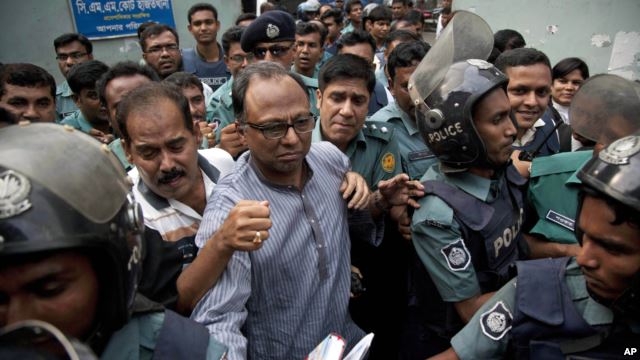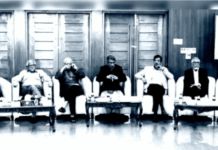Maaz Hussain
Police in Bangladesh have arrested a veteran journalist on charges of plotting to kill the formerly U.S.-based son of Prime Minister Sheikh Hasina, and they are preparing to arrest another newspaper editor in the same case.
Following Saturday’s arrest of Shafik Rehman, 82, editor of the monthly magazine Mouchake Dhil, police said he visited the U.S. in 2012 to facilitate a secret deal with an FBI special agent seeking confidential information about Hasina’s son Sajeeb Wazed Joy and help in the conspiracy to abduct and kill him.
Police said that while Rehman was being interrogated, newspaper editor Mahmudur Rahman, who has been in jail following his arrest for sedition and other charges in 2013, would be taken in next. Rehman and Rahman both are known as journalists who are backed by the opposition Bangladesh Nationalist Party (BNP).
Hasina said Monday in Dhaka that “American investigators caught one FBI agent taking a bribe from a BNP leader. The involvement of Shafik Rehman and Mahmudur Rahman in the conspiracy got exposed in an American court, not in any Bangladeshi court.”
Facebook post
Upon Rehman’s arrest, Joy, who lives in Bangladesh now, wrote in a Facebook post Sunday: “The U.S. Department of Justice discovered Shafik Rehman’s direct involvement in the plot to kidnap and kill me. They provided this evidence to our government. He was arrested based on this evidence.”
Khaleda Zia, former prime minister of Bangladesh and chairperson of the BNP, said that by arresting Rehman, the government had shown its autocratic face.
“In his writings, Shafik Rehman relentlessly exposed failure, corruption and other malpractices of this government. Trumped-up charges have been slapped against him, and he has been arrested because the government could not restrict him from writing in other ways,” Zia said in a statement.
Last year, a U.S. court sentenced former FBI Special Agent Robert Lustyik to five years in jail for taking bribes from Bangladeshi immigrant Rizve Ahmed, a k a Caesar.
According to the U.S. Department of Justice, Lustyik was sentenced “for accepting and soliciting bribes in exchange for providing internal law enforcement documents and other confidential information about a prominent citizen of Bangladesh for use by a political rival.
The son of a U.S.-based BNP leader, Ahmed received a 42-month prison term in the case and he remains in jail in the U.S.
After Ahmed was sentenced last year, police in Dhaka initiated a criminal case against some BNP leaders for allegedly attempting to abduct and kill Joy.
Rehman was not named as an accused either in the bribing case in the U.S. or in the case in Bangladesh. But in the course of the investigation, his involvement in the plot was detected, police said.
In a statement, a group of journalist union leaders in Dhaka sought immediate release of Rehman and said his arrest in the case was “extremely illogical.”
“Shafik Rehman is known for his writing in support of democracy and good governance. His arrest is a blow to the rights to our freedom of expression,” the statement said.
Threats to freedoms seen
Rights group campaigners say that the Hasina-led government has been using harsh tactics to crack down on dissent, which, they say, could threaten freedom of speech and press in Bangladesh.
The Hasina-led government relies on such tactics as its key weapon after “occupying the office without the people’s true mandate,” said legal rights activist Mohammad Ashrafuzzaman, liaison officer of the Hong Kong-based Asian Legal Resource Center.
“The use of strong-arm tactics is not surprising in a jurisdiction where the basic rule-of-law institutions, like the law enforcement agencies, the crime investigation agency, the prosecution and the courts, survive as subjugated tools in the hands of the government of the day,” Ashrafuzzaman told VOA.
Hasina and her Awami League-led government are using sedition and criminal defamation laws to systematically silence media voices that they view as being hostile to their interests, said Phil Robertson, Asia deputy director of Human Rights Watch.
“By going after leading editors of newspapers and magazines using harsh criminal charges, it’s clear she’s engaged in a bare-knuckled pummeling of what remains of Bangladeshis’ rights to freedom of the press and freedom of expression,” Robertson told VOA.
Source: VOA










